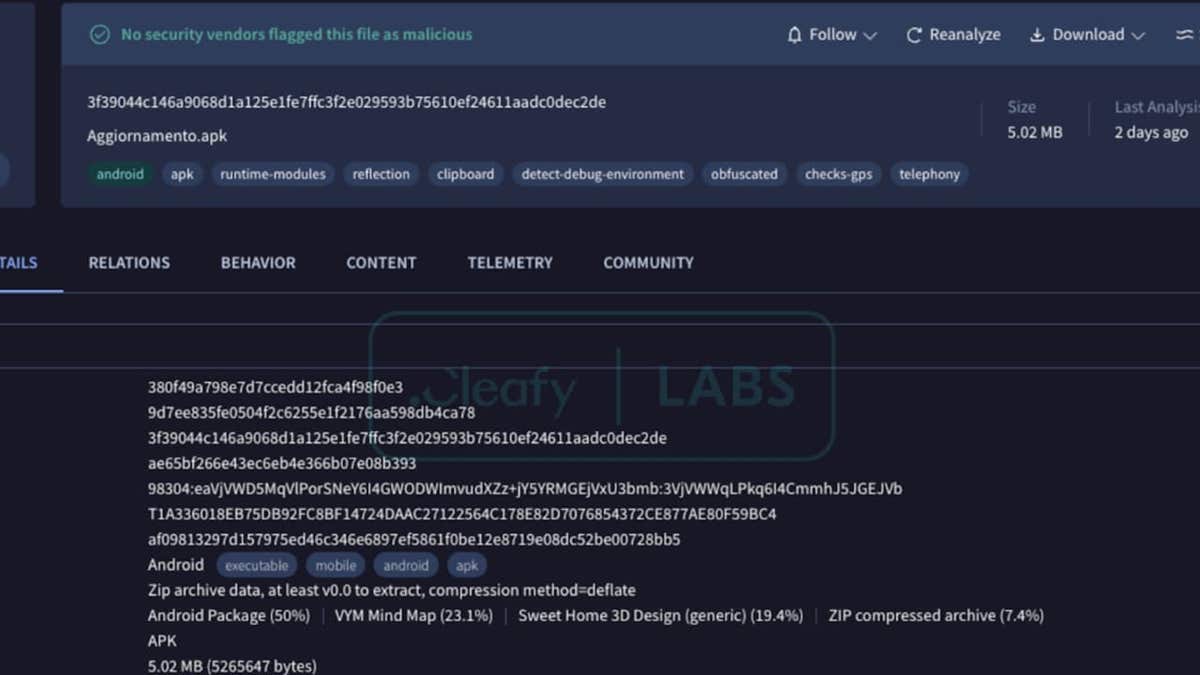The scammers always come with new tricks. Just when you begin to feel -you are sure to detect phishing emails, suspicious links and false bank applications, they find a new angle. Lately, they have become more and more creative, addressing the integrated features of our phones to remove their schemes. One of the last goals is NFC, the technology behind the payment.
It may seem harmless, but a new scam uses it so that most people would never expect. An Android Malicious Software called Supercard goes beyond stealing card data. Give attackers to use your card remotely for real transactions. And the worst part is that it all starts with something as simple as a text message.
UNIV: Get my expert technology tips, critical security alerts and exclusive offers, as well as instantaneous access to my Free Survival Survival Free “ When you register!
An Android phone (Kurt “Cyberguy” Knutsson)
What makes supercard x different?
Supercard X stands out from other malicious Android programs due to operation. As reported Cleafy researchersInstead of stealing user names, passwords or verification codes, it uses a method called NFC relay. This allows the attackers to copy the data of the victim’s device card in real time and use them in another place to pay or withdraw cash. The process does not require physical access to the card or knowledge of the PIN.
Malicious software is offered through a malicious software model as a service, which means that different cybercrimers can use it in their own regions. This makes the threat more scalable and harder to contain. Unlike most bank Trojans, Supercard X is not focused on a specific institution. It aims at any card holder, regardless of which the bank issued its card.
Another key difference is how furtive is malicious software. Use minimum permissions and does not include additional functions that facilitate detection. This lean approach helps to prevent the detection of antivirus software and allows it to work quietly on infected devices.

Supercardx completely undetectable (fud | Cleafy) (Kurt “Cyberguy” Knutsson)
200 million social media records were leaked to breach X Major X
How the scam works
Fraud begins with a message sent via SMS or WhatsApp. It is intended to be from a bank and warns the recipient about a suspicious transaction. The message includes a phone number and urges the person to call to solve the problem. This is the first step in gaining the victim’s confidence.
Once on the telephone, the attacker raises as a bank representative and walks the victim through a false security process. This may include asking them to confirm personal data or that they adjust the settings of their mobile banking application, such as eliminating spending limits on their card.
The attacker then asks the victim to install a mobile application that is described as a tool to verify the account or improve security. In fact, this application contains Malicious Software Supercard X. After the installation, the attacker asks the victim to touch his card against the phone. The malicious software then captures the NFC data on the card and sends them to a second telephone -controlled phone by the attacker.
Using the copied data, the attacker can make contact without contact or withdrawn by cashmen instantly. This method allows them to steal funds quickly and leaves little opportunity for banks or victims to intervene over time.

A woman traveling to the phone (Kurt “Cyberguy” Knutsson)
Malicious software exposes 3.9 billion passwords in a huge threat of cybersecurity
8 ways to keep -to the safety of Malware Supercard X
1) Please be careful of suspicious texts and calls. Use a strong antivirus software: Fraudulent campaigns often start with an SMS or call that seems to come from your bank. These messages usually say that there is a suspicious activity in your account and you will ask you to click a link or to mark a number to solve the problem. However, this is a tactic used to access your personal information. A approach -always these messages with skepticism.
The best way to protect the malicious links that install malicious software, which can potentially access private information, is to install a strong antivirus software on all your devices. This protection can also alert you to Phishing emails and ransomware scams, maintaining safe personal information and digital assets. Get my options for the best antivirus 2025 protection winners for your Windows, Mac, Android and iOS devices.
2) Avoid installing applications of non -reliable sources: One of the key ways of the ways of Malware as Supercard X is through misleading applications that victims are persuaded to install. These applications often seem harmless, posing as security tools or account verification. If you receive a link to download an app using email applications, send -ye an email or courier like WhatsApp, do not click. Instead, only download sources of trust, such as Google Play Store. In addition, carefully review the application permits and avoid granting unnecessary access, especially sensitive data such as NFC, location or personal contacts.
3) Disable NFC when not used: NFC, or nearby field communication, is a useful feature that allows contact payments and exchanges without contact. However, attackers can explode to capture your card information without even realizing it. To minimize the risk of being a victim of nfc -based malicious software such as Supercard X, turn off NFC when you do not use it actively.
In most Android devices, you can do it if you go to “Settings”, then “connected devices” or “connection preferences”, where you will find the NFC switch. By deactivating NFC, the phone will not transmit wireless data, which helps to protect the information from your payment card from being stolen by nearby attackers.
4) Look closely at your bank accounts and cards: If your device has come in contact with the Supercard or anything similar, the bank data may already be committed. That is why it is important to regularly check your transactions story for anything weird, such as a small payment you don’t remember to do or a strange location charge could be a sign of misuse. If you detect something suspicious, report it to your bank right away. It is also worth consulting your credit reports from time to time to take signs of identity theft before a snowball are made in larger problems.
5) Use a personal data removal service: If the scammers have oriented you once, there is a greater possibility that they try again, especially if your personal data (such as your phone number, address or email) are easily online. Data removal services scan people and runners search sites, and then request deletion of your information. This reduces your exposure and helps prevent future phishing attacks or social engineering.
While no service can guarantee complete deletion of your Internet data, a data removal service is really a smart choice. They are not cheap and is not your privacy either. These services do all the work to systematically control and clear the personal information of hundreds of websites. It is what gives me peace of mind and has proven to be the most effective way to delete your personal Internet data. By limiting the available information, reduce the risk of reference fraudster to breaches with information they could find on the dark network, which makes them more difficult to guide you. View my most important options for data removal services here.
6) Please contact your bank and freeze your cards: If you think you have touched or managed a suspicious card, or if the phone acted strangely later, do not brush it. Call your bank and let them know what happened. They can freeze your card to stop unauthorized payments and issue a new one for added safety. You must also ask them to control your account more closely for a while. Also, put a fraud alert with a credit cabinet so that no one can easily open a new line of credit on your name.
7) Consider registration in identity theft protection services: If you have been directed by a sophisticated scam like Supercard X, there is a possibility that your personal information, not just your card data, may be at risk. Identity theft companies can supervise personal information, such as your Social Security number, telephone number and email address, and alert -you are sold on the dark web or used to open an account. They can also help you freeze your bank and credit card accounts to prevent more authorized use by criminals. Check my tips and the best options on how to protect -you are from the theft of identity.
8) Report the scam to your National Cybercrime Authority: Whether you have lost or not money, inform the scam of the authorities to keep track of emerging threats and to warn -others. You can report this FBI fraud Crime allegations center on the Internet or the Federal Commission of Commerce. Your report could help catch the people behind the scam or at least close their infrastructure.
What security is my password? Use this test to know
Kurt’s Key Takeaway
The Supercard X Malicious Software campaign is a significant change in the way cybercrimers are oriented to people and financial institutions. Explosing NFC technology and combining -with social engineering tactics, attackers have found a way to avoid traditional fraud detection systems. What is especially derived is the speed that these attacks develop, which makes them more difficult to detect before the damage is done. As this threat evolves, it is important for both consumers and institutions to recognize the possible risks of these multi -plate fraud strategies.
Do you think Google is doing enough to protect -Do you from malicious software? Do -us to know by writing -us to Cyberguy.com/contact.
For more information on my technology tips and security alerts, subscribe -Free Cyberguy Report Bulletin Cyberguy.com/newsletter.
Ask a question to Kurt or to know what stories you would like to cover.
Follow Kurt on its social channels:
Answers to Cyberguy questions More tasks:
New of Kurt:
Copyright 2025 cyberguy.com. All rights reserved.
#Android #scam #hackers #credit #card #remotely
Image Source : www.foxnews.com
